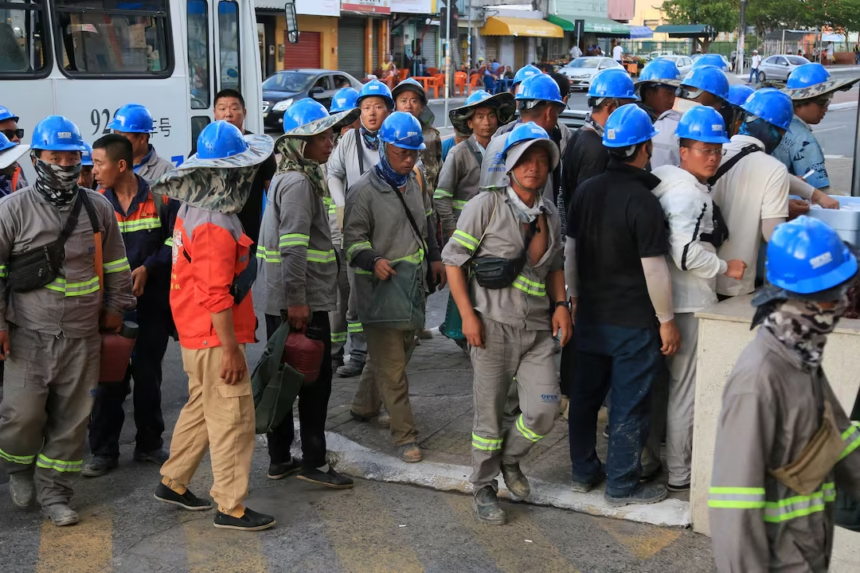RIO DE JANEIRO — Brazilian labour prosecutors have launched a lawsuit against BYD, a leading Chinese electric vehicle firm, along with two subcontractors, accusing them of widespread human trafficking and subjecting workers to conditions resembling modern slavery at a factory site in Bahia.
Findings from a 2024 investigation reveal that 220 Chinese employees faced forced labour, withheld pay, and poor living conditions, all while being watched by armed guards.
The factory in Bahia, backed by a $620 million investment from BYD, was set to drive the company’s growth in Brazil, its largest overseas market. In 2024, nearly 20% of BYD’s global sales outside China were made in Brazil.
The plant, which aimed to roll out 150,000 vehicles each year from 2025, reflected China’s rising economic presence in South America. The recent disclosures, however, have cast doubt on the company’s labour practices and raised concerns about how Chinese businesses treat workers abroad.
Brazilian prosecutors report that the workers, hired by the subcontractor Jinjiang Open Engineering, were brought over from China with misleading promises. Instead of the skilled jobs they were offered, the workers carried out heavy manual tasks like bricklaying and welding, working 12-hour days with no weekly breaks.
BYD Withheld Wages
Prosecutors say their contracts included banned clauses: up to 70% of wages withheld as a “deposit,” with high financial penalties for early resignation. Some workers paid $900 upfront for their jobs, only to be denied wages if they left before six months.
Conditions at the Camaçari site were described as “degrading.” Inspections since November 2024 have found workers sleeping on bunks without mattresses, storing food with their items in crowded and unsanitary rooms.
Thirty-one workers shared a single bathroom, and meals were left unprotected on the floor, without refrigeration. Many showed visible skin damage from long hours in the sun, and at least four serious workplace accidents, including amputations, were reported due to unsafe practices.
Prosecutors also allege that workers had little freedom and were constantly monitored by armed guards. Jinjiang is accused of keeping the passports of 107 workers, which added to the atmosphere of control, one of the key elements under Brazilian law for defining “slavery-like conditions.” This legal term covers forced labour, poor working environments, excessive hours that risk health, debt traps, and any breach of human dignity.
The situation became public on 23 December 2024, when a task force from Brazil’s Ministry of Labour, the Ministry of Labour and Employment, the Federal Public Defender’s Office and the Federal Police rescued 163 workers.
After this operation, the Ministry of Foreign Affairs suspended BYD’s temporary work visas, citing irregularities in the recruitment process. Investigators later identified 57 more affected workers, bringing the total to 220.
Executives Deny Wrongdoing
BYD responded by ending its contract with Jinjiang “immediately” and moved the workers to hotel accommodation. The company has denied all wrongdoing and claims to follow both Brazilian and international labour rules.
BYD’s local branch said it remains committed to ethical standards, and Senior Vice President Alexandre Baldy said they are working with authorities. Still, BYD has faced backlash for allegedly spying on Brazilian staff after the rescue, raising fresh doubts about how it oversees labour on site.
Jinjiang has strongly denied the charges, calling them “inaccurate” and blaming cultural and translation issues. The company posted a statement on Weibo saying the accusations of “enslavement” insulted both the workers and the Chinese people. Jinjiang also released a video showing workers reading a letter denying abuse, but Brazilian officials have questioned this, noting that Jinjiang withheld 107 passports, which casts doubt on claims of voluntary agreement.
Prosecutors are seeking 257 million reais ($45 million) in collective damages, plus 50,000 reais for each violation per worker. They also want compensation for each day workers faced these conditions and demand full compliance with local labour laws.
The outcome of this case may set a new standard for how foreign firms are held to account in Brazil, where breaches of labour law can result in severe penalties, including being cut off from bank loans and facing criminal charges. Human trafficking and slavery-related offences could bring up to eight years in prison.
Global Attention on BYD
This scandal has triggered rare criticism of BYD on Chinese social media, with some users noting that the harsh conditions in Brazil are similar to those at construction sites in China. Hu Xijin, a well-known commentator and former Global Times editor, acknowledged possible missteps and called for better treatment of staff by Chinese companies.
China’s foreign ministry, through spokesperson Mao Ning, said it was checking the facts and stressed that Chinese firms must follow the law wherever they operate.
This case has put Brazil and China’s growing partnership in the spotlight. Under President Luiz Inacio Lula da Silva, Brazil has made local job creation a priority, and China’s habit of bringing in its workers has long been controversial.
As the 7 January 2025 hearing approaches, where a resolution to the dispute could be discussed, the result may change how BYD operates in Brazil and affect how Chinese businesses are viewed around the world.
At present, the 220 workers are staying in hotels while talks continue. The Bahia factory, once a symbol of cooperation and economic growth, now stands as a warning about the risks workers face during rapid industrial expansion.
As Brazilian officials push ahead, global attention remains fixed on whether those caught up in these abuses will see justice.













